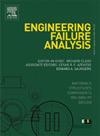Low-cycle fatigue behavior of U71Mn rail steel with pre-corrosion
IF 4.4
2区 工程技术
Q1 ENGINEERING, MECHANICAL
引用次数: 0
Abstract
Rail steels that are extensively exposed to the humid natural environment increasingly experience corrosion fatigue, emerging as a potential and hazardous failure mode. This work investigates the low-cycle fatigue behavior of pre-corrosion U71Mn rail steel. The corrosion features, cyclic stress–strain response, fatigue life, and underlying mechanisms are systematically analyzed. The results suggest that pre-corrosion decreases the plasticity and fatigue life of the steel. Moreover, a low strain amplitude induces stronger degeneration of fatigue life than a high strain amplitude. Numerous fatigue cracks initiated from corrosion pits are observed. Corrosion pits provide favorable conditions for crack initiation, resulting in lower fatigue life. Moreover, the hydrogen embrittlement is identified as a contributing factor in the degeneration of fatigue life. A fatigue life prediction model is developed by considering the plastic loss induced by the pre-corrosion, and the prediction error between the results and experimental value is in the two-factor band. This work contributes to a deeper understanding of the fatigue behavior of rail steels and provides a simple way of engineering applications.
求助全文
约1分钟内获得全文
求助全文
来源期刊

Engineering Failure Analysis
工程技术-材料科学:表征与测试
CiteScore
7.70
自引率
20.00%
发文量
956
审稿时长
47 days
期刊介绍:
Engineering Failure Analysis publishes research papers describing the analysis of engineering failures and related studies.
Papers relating to the structure, properties and behaviour of engineering materials are encouraged, particularly those which also involve the detailed application of materials parameters to problems in engineering structures, components and design. In addition to the area of materials engineering, the interacting fields of mechanical, manufacturing, aeronautical, civil, chemical, corrosion and design engineering are considered relevant. Activity should be directed at analysing engineering failures and carrying out research to help reduce the incidences of failures and to extend the operating horizons of engineering materials.
Emphasis is placed on the mechanical properties of materials and their behaviour when influenced by structure, process and environment. Metallic, polymeric, ceramic and natural materials are all included and the application of these materials to real engineering situations should be emphasised. The use of a case-study based approach is also encouraged.
Engineering Failure Analysis provides essential reference material and critical feedback into the design process thereby contributing to the prevention of engineering failures in the future. All submissions will be subject to peer review from leading experts in the field.
 求助内容:
求助内容: 应助结果提醒方式:
应助结果提醒方式:


